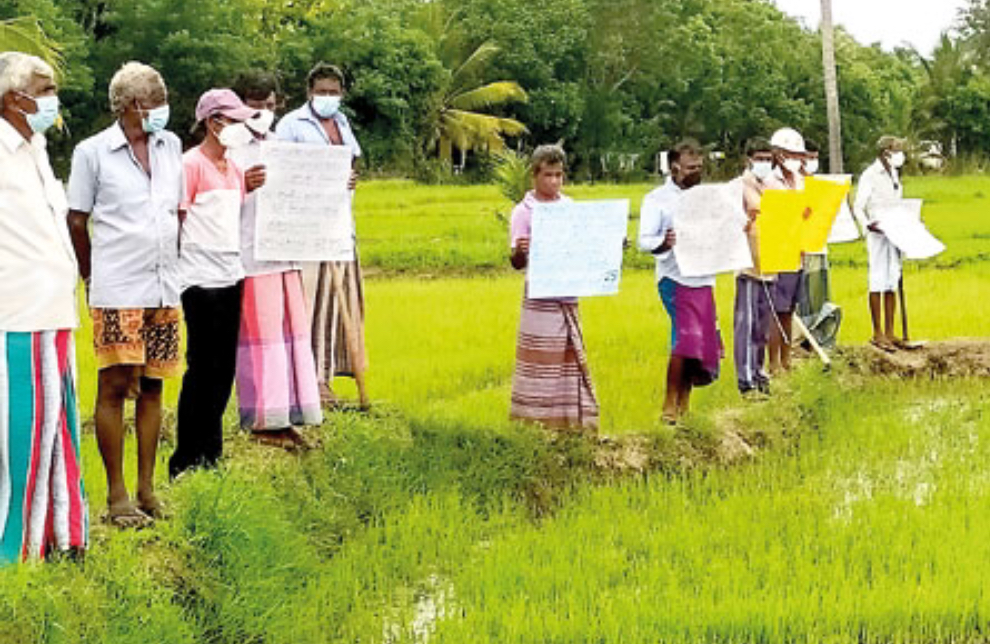Weeks after the government’s decision to ban the import of chemical fertilizer it looks set to do a U turn to allow the import of chemical fertilizer for floriculture. ‘There has been a partial relenting’, said an observer. ‘Although there are discussions, the process is still not clear’. The reverberations of the ban, which most in the agriculture industry welcome in principle but are unhappy about its suddenness and evident lack of pre planning and preparation, will be far reaching.
According to industry insiders there have been no fertilizer imports since the ban earlier in the year, and what is available in the country is what was imported before it. While some of this fertilizer is being distributed to paddy farmers through agrarian services others such as fruit and vegetable growers have not been provided any fertilizer and have had to buy it themselves from companies that used to import it. When these fertilizer stocks have been exhausted the expectation is for farmers to start producing their own organic fertilizer for which the government has promised them an allowance of 10, 000 rupees. While it is unclear if they have received the training for this process which is labour intensive and will cost more, there is uncertainty about the consistency of the product. Industry experts are skeptical about producing the volume of organic fertilizer which is required since it is approximately ten times more than that of chemical fertilizer. The process they say will require at least two years.
The ban’s immediate knock- on effect will be on production, which will see a drop. ‘Because of uncertainty about the availability of fertilizer, farmers will confine their cultivating to existing crops and land extents without planting anything new’, said an industry expert.
Experts also predict food shortages and an increase in food prices. They point out that the challenge will start in the next Maha season based on how many farmers reduce the seeds they put on the ground. Seed importers have already started reducing the quantities they import because there has been a reduction in demand. If this reduction extends to maize seeds as well, it will also affect animal husbandry since maize is used in animal feed for cows and chicken.
Meanwhile three container loads of organic fertilizer which arrived from India several weeks ago are still in the Colombo port pending clearance. The containers cannot be released to the market without a letter of no objection each from the Director General of the Agriculture Department, the Fertilizer Secretariat and the Controller of Import and Export. Although the letters from the Fertilizer Secretariat and the Import Controller had been produced before the containers left India, the letter from the Director General of Agriculture has not been forthcoming so far. It is unclear how the containers were shipped to Sri Lanka without all three letters in place when they left India since this is the norm.
The loss of livelihoods, collateral as a result of the ban, will be difficult to measure. In the fruit and vegetable export sector alone, the livelihoods of up to 10, 000 workers hang in the balance.
At the start of the week it was rumoured that Dole Sri Lanka, which employs around 2000workers, is planning to leave the country. Their product carries the Good Agriculture Management label and in addition to being hand weeded and free from herbicides, is grown on carefully curated soil which could be a challenge for fertilizer companies to provide if they have no fertilizer to sell.
Dole, which is a Japan based multinational company synonymous for its brand of Cavendish bananas, also has a number of outgrowers and others whose livelihoods depend on the secondary market from its produce. The communities that live in close proximity to the company’s farms benefit from the various micro finance opportunities it provides. They are off shoots of its main banana growing operation and uplifts the living standards of these communities.
In addition to the ban’s impact on livelihoods, the hit on earnings from the export of fruit and vegetables is predicted to burn a hole in the country’s purse.
Dole for example, is singularly responsible for 60 percent of the foreign exchange from the export of fruit and vegetables. In the last five years, it brought in the most amount of foreign exchange in the fruit and vegetable sector and generated 13. 5 million US$ last year. The company has been operational in Sri Lanka since 2005 and cultivates around 730 hectares of bananas in the Badulla and Moneragala districts which it exports to China, the Philippines and the Middle East. It also exports pineapples to the Philippines. Every month it exports around 80, 40– foot– long containers packed with bananas which is still not sufficient to meet the demand in countries like the Middle East because the extent of land that is cultivated is low and production is also low as a result. The fertilizer ban will exacerbate Sri Lanka’s vulnerability as a supplier of fruit and vegetable with growing competition from countries like Vietnam which is opening up to foreign direct investments.





